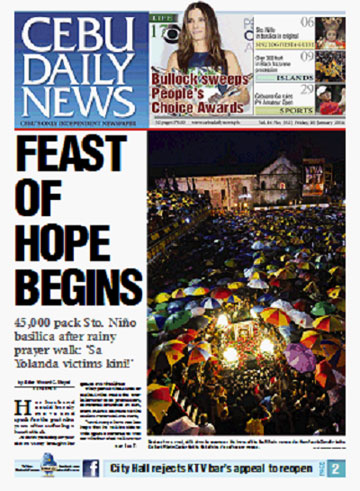
At dawn yesterday, 65-year-old Fe Vicoy brought her spouse in a wheelchair.
They joined thousands of faithful who made the two-kilometer foot procession, sometimes drenched in rain, from Fuente Osmena to the Basilica Minore del Sto. Niño,
“Until now, I have not lost hope that he will be able to walk again. I continue to wait for whether God will answer my prayer,” said Fe, a mother of three from barangay Inayawan, Cebu City.
She was part of a huge throng that gathered before 4 a.m. for the annual “Walk with Jesus” that opens 9 days of masses for the feast of Cebu’s patron. Several brought Sto. Niño images from their home altars and carried them in their arms.
Fe said she prayed for strength, especially after her husband suffered eight seizures due to fear when a powerful earthquake rocked Cebu on Oct. 15.
CALAMITIES
The recent calamities, including typhoon Yolanda, gives this year’s religious feast a special poignance for Cebuanos and other Visayans, many of whom lost homes, loved ones and suffered more hardship with the disaster’s impact on a recovering economy.
At the basilica, people danced the Sinulog in unison after the close of the first novena mass. They shouted their petitions, some of them echoing their recent encounters with disaster: “Pit Señor, sa mga linog victims kini! Pit Señor sa mga Yolanda victims kini. Pit Señor sa mga volunteers kini!”
(Hail, Lord, this petition is for earthquake victims… this is for Yolanda victims… this is for the volunteers.)
Fr. Jonas Mejares, the rector, expressed his amazement at the size of the crowd.
“No amount of rain can dampen your expression of love for the Lord,” he said in Cebuano.
He said the crowd’s presence was “proof that indeed Cebu is the source and cradle of Christianity in the country”.
At its peak, the crowd reached 45,000 upon reaching the basilica’s Pilgrim Center while the procession drew 30,000 to 35,000, said Chief Insp.
Wildemar Tiu of the Waterfront Police Station.
The church courtyard which has a capacity of 3,500 was packed. Many had to stay on the streets outside to participate in the Mass, whose proceedings were beamed on large LED screens.
Many carried umbrellas and lighted candels in the wet, chilly early morning. There were no fireworks or balloons along the route of the solemn procession.
They recited the rosary and sang hymns aired live on radio and loud speakers.
The flower-decked carroza that carried the image of the Sto. Niño arrived at the basilica at 5:45 a.m. A lay ministed annnounced its arrival as people clapped and shouted “Viva Pit Señor!”.
The belfry, destroyed by last year’s earthquake, was silent.
After the calamities that hit Cebu and the Visayas last year, Mejares urged people:
“Let us not remain in sadness and grief. Every devastation we experience is a challenge that simply passes.”
He said the child Jesus, “the Sto. Niño is our hope. He’s our strength to move on.”
Mejares’ parents and relatives in Loon, Bohol province also lost their homes in the aftermath of the 7.2-magnitude earthquake last October.
He reminded people that they did not suffer alone.
Wala ako mag-inusara. Ang Sto. Nino uban kanako. Siya ang akong paglaum. (I am not alone. The Sto. Niño is with me. He is our hope).”
He ended his homily by singing the Broadway classic “You’ll Never Walk Alone”.
As part of tradition, the fiesta’s Hermano and Hermana Mayores for 2014 were officially presented , Jay Roble and his wife Elvina.
When the special hymn of the Sto. Niño “Bato-Balani sa Gugma” was sung, people waved their hands in the air in unison.
At the end of the Mass, the rector carried the image of the Sto. Niño and led people in dancing the traditional Sinulog for about five minutes.
The basilica complex is open 24 hours a day until the feast day on January 19. Eleven daily masses are celebrated in the outdoor Pilgrim Center starting 4 a.m. until the last mass at 7 p.m.